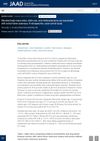 5 citations,
December 2016 in “Journal of skin and stem cell”
5 citations,
December 2016 in “Journal of skin and stem cell” People with cutaneous Lichen Planus are more likely to have Metabolic Syndrome and related conditions like high cholesterol, diabetes, and high blood pressure.
4 citations,
January 2018 in “JBRA assisted reproduction” Orlistat helped reduce weight and testosterone in obese women with PCOS but did not significantly affect other androgens or cholesterol levels.
 December 2023 in “Benha Journal of Applied Sciences”
December 2023 in “Benha Journal of Applied Sciences” Men with male pattern baldness have higher blood sugar, bad cholesterol, and ZAG protein levels than healthy men.
 February 2023 in “Journal of The American Academy of Dermatology”
February 2023 in “Journal of The American Academy of Dermatology” Being overweight, having gallbladder removal surgery, and taking cholesterol-lowering drugs are linked to a higher chance of getting vulvar lichen sclerosus.
 53 citations,
December 2015 in “JAMA Dermatology”
53 citations,
December 2015 in “JAMA Dermatology” Women with PCOS often have more body hair, acne, and skin darkening, and these signs are linked to metabolic issues like insulin resistance and high cholesterol.
 5 citations,
October 2021 in “Journal of Ovarian Research”
5 citations,
October 2021 in “Journal of Ovarian Research” Cinnamon can help manage symptoms of polycystic ovary syndrome, improve menstrual cycles and fertility, and positively affect cholesterol and blood sugar levels, but more research is needed to confirm these effects and find the best dosage.
November 2022 in “Frontiers in Medicine” Severe hair loss in Chinese men is linked to high blood pressure, while in women, it's linked to larger waist size and cholesterol issues.
 2 citations,
December 2021 in “Cureus”
2 citations,
December 2021 in “Cureus” Most women with Polycystic Ovary Syndrome (PCOS) have skin issues like excessive hair, acne, or hair loss. Hormone imbalances are common, and age, certain hormones, and hormone ratios can predict acne. Obesity, infertility, and high cholesterol are also common in these women.
 268 citations,
April 2009 in “International Journal of Pharmaceutics”
268 citations,
April 2009 in “International Journal of Pharmaceutics” Niosomes improve minoxidil skin delivery for hair loss treatment.
 233 citations,
November 2002 in “The journal of investigative dermatology/Journal of investigative dermatology”
233 citations,
November 2002 in “The journal of investigative dermatology/Journal of investigative dermatology” Creating stronger blockers for skin enzymes might lead to better treatment for conditions like acne and excessive hair growth.
 222 citations,
September 2016 in “JCI insight”
222 citations,
September 2016 in “JCI insight” Tofacitinib is safe and effective for severe alopecia areata, but hair loss may return 2 months after stopping treatment.
 175 citations,
April 1982 in “Journal of The American Academy of Dermatology”
175 citations,
April 1982 in “Journal of The American Academy of Dermatology” Isotretinoin is highly effective in treating severe acne, rosacea, and gram-negative folliculitis.
 162 citations,
April 2016 in “The Lancet Diabetes & Endocrinology”
162 citations,
April 2016 in “The Lancet Diabetes & Endocrinology” Testosterone therapy in transgender men has both desired effects like increased muscle mass and potential health risks such as higher cardiovascular risk.
 80 citations,
April 2018 in “Trends in Molecular Medicine”
80 citations,
April 2018 in “Trends in Molecular Medicine” Lichen Planopilaris and Frontal Fibrosing Alopecia may help us understand hair follicle stem cell disorders and suggest new treatments.
76 citations,
October 2016 in “Clinics in dermatology” Sex hormones, especially androgens, play a key role in causing acne.
 74 citations,
March 1963 in “Archives of Dermatology”
74 citations,
March 1963 in “Archives of Dermatology” Triparanol therapy can cause hair loss and skin dryness without inflammation or damage to hair follicles or skin structures.
 72 citations,
December 2012 in “Expert Opinion on Drug Delivery”
72 citations,
December 2012 in “Expert Opinion on Drug Delivery” Niosomes are promising for skin drug delivery, offering benefits like improved drug penetration and stability.
 55 citations,
November 2018 in “American journal of human genetics”
55 citations,
November 2018 in “American journal of human genetics” Mutations in the LSS gene cause a rare type of hereditary hair loss.
 53 citations,
September 2014 in “Reproductive Biology and Endocrinology”
53 citations,
September 2014 in “Reproductive Biology and Endocrinology” Different types of PCOS have different levels of metabolic problems, with the most severe type showing the highest disturbances.
 50 citations,
August 2017 in “Diabetologia”
50 citations,
August 2017 in “Diabetologia” Metformin has limited effectiveness for improving PCOS symptoms and lacks clear benefits, needing more research to confirm its efficacy.
 46 citations,
May 2012 in “Molecular and Cellular Endocrinology”
46 citations,
May 2012 in “Molecular and Cellular Endocrinology” Human skin produces sex hormones like estrogen and testosterone, influenced by ARO and StAR, which may affect skin elasticity and hair growth.
 41 citations,
June 2010 in “Anais Brasileiros de Dermatologia”
41 citations,
June 2010 in “Anais Brasileiros de Dermatologia” Isotretinoin is safe and effective for acne, with common side effects like dry lips; serious side effects are rare.
41 citations,
May 2005 in “International Journal of Cosmetic Science” Human hair contains various lipids that vary among individuals and help protect the hair.
36 citations,
January 2004 in “European journal of cell biology” Without keratin 10, there's more growth and development of oil-producing skin cells.
34 citations,
July 2020 in “American journal of human genetics” Changes in the SREBF1 gene cause a rare genetic skin and hair disorder.
31 citations,
December 2012 in “British Journal of Dermatology” Korean women's hair thins, weakens, and greys with age, with mineral and sterol changes.
 28 citations,
March 2009 in “Clinical and Experimental Dermatology”
28 citations,
March 2009 in “Clinical and Experimental Dermatology” There is no significant link between male pattern baldness and insulin resistance.
 24 citations,
September 2001 in “Journal of The American Academy of Dermatology”
24 citations,
September 2001 in “Journal of The American Academy of Dermatology” Women's ovarian hormones and adrenal androgens change throughout life, affecting hair loss and health.
 24 citations,
July 2018 in “Stem cells”
24 citations,
July 2018 in “Stem cells” Runx1 controls fat-related genes important for normal and cancer cell growth, affecting skin and hair cell behavior.
 23 citations,
February 2020 in “PLOS genetics”
23 citations,
February 2020 in “PLOS genetics” Mice with LSS deficiency showed hair loss and cataracts, similar to humans, and can help in understanding and treating this condition.






















